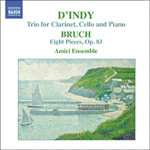
Bruch: 8 Pieces, Op. 83 / D'Indy: Clarinet Trio, Op. 29
 $25.00
Low Stock
add to cart
$25.00
Low Stock
add to cart
MAX BRUCH / VINCENT D'INDY
Bruch: 8 Pieces, Op. 83 / D'Indy: Clarinet Trio, Op. 29
Amici Ensemble
[ Naxos / CD ]
Release Date: Wednesday 9 November 2005
Should this item be out of stock at the time of your order, we would expect to be able to supply it to you within 2 - 5 business days.
"The recording acoustic is generous, and while Valdepeñas brings warm-tone to his clarinet playing, Patricia Parr is sympathetically discreet in her role as accompanist yet confident as a virtuoso. This is a valuable addition to the catalogues and a must either for collectors of alternative versions or for lovers of Romantic music in general."
(MusicWeb Oct 2005)
Max Bruch was a child prodigy who grew into a gifted composer of extraordinary taste and refinement. Throughout his career he consistently produced works of professional finish and great beauty. Although today he is remembered primarily for his concertos, particularly his Violin Concerto in G minor, he composed successfully in virtually every medium. Critical of the innovations brought about by Liszt and Wagner, Bruch preferred instead the more conservative styles of Mendelssohn and Schumann. His resistance to change and a firm belief in traditional forms and harmonies meant that works written at the end of his life sound much the same as compositions written sixty years earlier. Despite his deft skills of orchestration and an almost unequalled talent for melodic invention, he was, at his death, an honoured yet lonely and neglected composer. Many of his compositions remain unjustly forgotten.
The Eight Pieces, Op. 83, for clarinet, cello (or viola), and piano, were composed in Berlin in 1910. Despite being written at a time when many composers were experimenting with modernism, they are thoroughly Romantic in style. The instrumentation allows for the production of a luscious sound, and Bruch responded with melodies and harmonies that are correspondingly rich and glowing. Although only Rumanian Melody and Night Song carry descriptive titles, all eight are programmatic in the sense of presenting a characteristic mood or idea. The melodies are nobly inspired and Bruch's handling of the individual instruments is masterful and effective.
Vincent d'Indy came from an aristocratic military family in the Ardèche region in southern France. Although he received piano lessons and showed musical promise as a boy, he remained more interested in military matters and his hero, Napoleon. Only during an extended trip to Italy at the age of eighteen did he become aware of his potential as a composer rather than an army officer. On the recommendation of his friend Henri Duparc, d'Indy entered César Franck's organ and composition classes at the Paris Conservatoire, devoting himself thereafter entirely to music. Franck had an important influence on d'Indy's musical style, as did Beethoven and Wagner, but his devout Catholic upbringing also led to an interest in Gregorian chant that, coupled with his love of folk-song, can be heard in many of his compositions.
The Trio in B flat major dates from 1888 and is the first important work in d'Indy's mature style. Although it does not follow a specific model, it owes much to Franck's emphasis on structural unity. Several ideas recur throughout the work, but the first theme in particular plays an important structural rôle. It is used in all four movements, appearing as both melody and accompaniment and in combination with the other thematic material. As a pianist who occasionally played both the cello and the clarinet, d'Indy understood and wrote effectively for all three instruments. It is a highly polished work that remained one of his particular favourites; he not only used it as an example in his composition classes, but also continued to perform it in public, playing the piano part, throughout his long life.
- Amici Ensemble
Tracks:
MAX BRUCH
8 Pieces, Op. 83
01. I. Andante 03:49
02. II. Allegro con moto 02:35
03. III. Andante con moto 06:41
04. IV. Allegro agitato 03:48
05. V. Rumanische Melodie: Andante 05:12
06. VI. Nachtgesang (Nocturne): Andante con moto 06:10
07. VII. Allegro vivace, ma non troppo 03:22
08. VIII. Moderato 04:34
VINCENT D' INDY
Clarinet Trio, Op. 29
09. I. Overture: Modere 14:11
10. II. Divertissement: Vif et anime 06:00
11. III. Chant Elegiaque: Lent 06:00
12. IV. Finale: Anime 09:43

